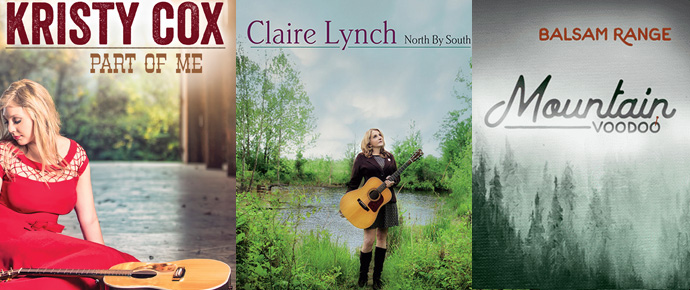
One of the favorite parts of my work for Bluegrass Today is the steady stream of music that fills my mailbox and my inbox. A close second is the joy of discovering and testing new products.
Hey, it’s a tough job, but somebody has to do it.
Actually, at this time of year, it is a tough job trying to find the best of the best, or as I call it, Dave’s Dozen. It could have easily been three dozen, but 12 seems about right.
A couple of caveats: First, the list is decidedly subjective. These aren’t necessarily the 12 best things that happened in bluegrass this year. But they’re my favorites. Your mileage may vary. Second, I deliberately excluded projects that I had a hand in; for instance, no CDs that I had songs on are on the list.
First up, nine CDs that stood out, for a variety of reasons:
My favorite CD of the year: JHT-1 from the Jim Hurst Trio. OK, Jim Hurst could play ukulele backed by steel drums and it would probably be somewhere near the top of my list. Here, he’s merely playing some of the best guitar you’ll hear in any genre. (There’s a reason why I called him “Three Hands Hurst” in a review a few years back). That Rice guy is pretty good, but these days, Hurst and folk-rocker Richard Thompson get my vote for the best of the best.
This CD’s greatness, though, is about much more than the bandleader’s glorious talents. He’s joined by Erik Alvar on bass and Nate Lee on fiddle and mandolin. Both are major talents, as evidenced by each of the 11 tracks here, and the three together are magical. The best cuts, to this critic, are Daisies for Judy, which Hurst wrote for his wife, and Modaliousness. Trust me, it’s a lot easier to listen to than to say.
Alas, fans of this iteration of the trio will have to settle for playing the CD. As I write, Lee is moving on to join the Becky Buller Band. But I eagerly await JHT-2, the band and the CD.
Number two on my list: Mountain Voodoo from Balsam Range. These guys just keep getting better. How good is this one? There’s a potential song of the year here, but it’s not written by Milan Miller, jokingly referred to by the band as their staff songwriter because he’s done so well writing for them in the past (and on this one, too). This time, the laurels go to Aaron Bibelhauser’s Blue Collar Dreams, an anthem for working stiffs everywhere that’s been dominating the charts. The song has quite a pedigree. Before the CD came out, it won the bluegrass category in the Chris Austin Songwriting Contest at MerleFest and was one of 10 songs that made the cut last year for IBMA’s Songwriter Showcase.
Number three: Claire Lynch’s North by South. When she announced that her next CD would feature Canadian songs – a nod to her Canadian husband – writers on this side of the border surely groaned at not getting a chance to have the three-time IBMA female vocalist of the year give her treatment to their songs.
But this isn’t just a gimmick. Songs by Gordon Lightfoot, J.P. Cormier, Ron Sexsmith and others, plus her own Milo – written for her husband and which I interpret as short for My Love — make this a stout contender for the Bluegrass Grammy this year.
The music comes from some of the best in the business – Jerry Douglas, Bela Fleck, David Grier and Stuart Duncan, for starters. But Lynch’s voice – that voice – is the centerpiece, as it should be.
Number four: Sacred Memories, from Joe Mullins and the Radio Ramblers. In my review last June, I wrote that this project “could probably make a grumpy angel sing (if there are, in fact, such things as grumpy angels).” I also posited that the CD “can stand up to any gospel recording I’ve heard in the last five years and could end up as one of the best bluegrass CDS of 2016, Gospel or otherwise.” It did.
Number five was one of those pleasant surprises. I didn’t know what to expect the first time I slid Kristy Cox’s Part of Me into the CD player. But she knocked my socks off and I’ve been looking for them ever since. The main attraction is her voice, which I praised in my review last year precisely because she didn’t sound like yet another Alison Krauss knockoff. (I love AK, but we already have one!) The songs, especially Chris Stapleton’s Daddy Doesn’t Pray Anymore, and masterful production by Jerry Salley, are the icing on a very tasty cake.
At number six: Michael Cleveland’s Fiddler’s Dream. He’s still a relative youngster, but someday he’ll take his place among bluegrass giants in the Hall of Fame. This is his first solo project in 10 years, following a run of gems from Michael Cleveland and Flamekeeper, but it was worth every bit of the wait. The best of the best here include Cleveland’s tune Henryville, with Jason Carter doubling with him on fiddle, and John Hartford’s Steamboat Whistle Blues, with Sam Bush singing lead.
My number seven favorite: Stringworks from Kristin Scott Benson. I expected a wonderful record from Benson, the banjo player for the Grascals. But she went far beyond that, delivering a stout, masterfully self-produced CD. As I noted in my review last year, I put stars in my notes next to songs that are worth singling out in the limited real estate I have to review a project. “Many CDs wind up with three, maybe four songs that are starred,” I wrote. “Stringworks has so many that my notes started to look like a flag.”
At number eight on my list of favorites is one that might be new to many of you: Rhyme & Season from James Reams and the Barnstormers.
This is a concept album filled with songs about people who are in pretty dark places, but it is, at its core, also about hope and redemption. James Reams knows about all of those things. At one point in the liner notes, he writes: “In my homeless days, I woke one morning at a shelter to find that the old man sleeping on the bunk below me had died in the night.” Out of that came the song $100 funeral.
At another point, he tells the backstory to Long Gone Out West Blues. He writes: “I headed out west after my partner, Tina, died. (New York City) just seemed gloomy and empty without her in it. But the warm sunny days of Arizona and new friends have restored me.”
James Reams has walked the walk of those who have been cast aside. In this CD, he talks the talk. Actually, he sings it – with conviction. There’s an authentic gritty feel to the music that can’t be faked.
Number nine is Korey Brodsky’s Cruizin’. I’ve been fortunate to hear so many young pickers since I started attending IBMA’s World of Bluegrass in 2010: Presley Barker, Melody Williamson, Jacob Gooding, Issac Moore and so many others. But Korey Brodsky has long been a personal favorite. Not because his father and I are bass playing friends, but because he’s a fantastic picker with talent and restraint that belie his years.
Though still a teen, Brodsky delivered a debut record that remains in regular rotation in my player. Most of the cuts are instrumentals, including four that Brodsky wrote. But there are also two standout vocal arrangements, featuring Jonathan Edwards. Yes, that Jonathan Edwards. (Brodsky’s dad has played bass with him over the years.)
This project is evidence that the future of bluegrass is in good hands.
To round out my list, two products and one development worth mentioning.
First is a chair. Yep, a chair. When he was working on songs and arrangements for his band, Tim Martin found his back paid the price for hour after hour of hunching over a notebook, a monitor or an instrument. When he couldn’t find a chair to provide the back support he required, he created one. The result, after endless experimentation and what he called “Frankensteining” – taking parts and ideas from different chairs – is the Rokher.
I first saw the chair at MerleFest last year, and was intrigued enough to enter a drawing to win one. Alas, my ticket didn’t get pick. I stopped by Martin’s booth later, although I almost decided not to test drive one of the chairs when I saw the price tag. Anyone spending north of $1,000 for a studio chair, I thought, had to be, um, off his rocker.
But I tried it anyway, and I liked it so much that one came back to Maryland with me. It’s a bit lower to the ground than a conventional chair, so you sit a bit differently, which seems to make all the difference to my back. Actually, not just my back. During a recent rehearsal in my music room, Howard Parker sunk into the chair during a break. Unprompted, the first words out of his mouth were, “That’s the best lumbar support ever.” The chair also looks good, with a sleek, modern style and a back that echoes the headstock of an acoustic guitar.
I use the chair all the time when I’m practicing or writing songs. Plus I’m pretty sure you’ll find me in it for hours at a time when I start working on a book project later this year. Some day, perhaps, I’ll have a second Rokher, so I won’t have to play musical chairs with my co-writers. Additional information is available at www.rokher.com.
The other product is a resophonic guitar from Paul Beard. Beard is a master builder. Mike Auldridge played his guitars. So does Jerry Douglas, along with many of the other top Dobro dudes. But until recently, you had to fork over $4,000 or more for a guitar made in Beard’s Hagerstown, MD, shop. That all changed in September, when Beard unveiled his Copper Mountain line at World of Bluegrass in Raleigh.
Resophonic guitars are labor-intensive to build. But Beard found a shortcut. The Copper Mountain guitars have the same cone and spider as his top models, but have a composite back and sides that cut hours of labor off the cost. The model I tested during World of Bluegrass had good sustain and sounded much better than I expected for a guitar costing well under half of Beard’s better models. So much better, in fact, that Copper Mountain guitar number 3 sits in my music room, right next to be my Rokher. (This job can get expensive!) Go to www.beardguitars.com for details.
Last on my list of favorites is the most positive development I saw in bluegrass music in 2016. It’s IBMA’s embrace of diversity. The diversity showcase in Raleigh featured some of the most energetic and engaging performances in a week of great music and the panel discussion was lively and frank. (I like to think that the Leadership Bluegrass Class of 2016, of which I was a part, had a part in this. We were all over the need for diversity in our class discussions, and some of my classmates were instrumental in getting events on the World of Bluegrass schedule).
Bluegrass, frankly, is too small to exclude people, whether it’s because they don’t worship at the altar of the founders, they’re gay or for any other reason. So Raleigh 2016 was a breath of fresh air. And, according to my friend Justin Hiltner, a key organizer of last year’s events, there’s more to come in 2017 and beyond. That’s wonderful news.
In the spirit of diversity, I want to talk about one more song. It didn’t make my list of favorites because it came out in 2015. But it’s a song with a message that I think everybody should hear at least once.
The song is Ain’t We Brothers, by Sam Gleaves. Not that it matters, but Gleaves is gay. He’s also one heck of a musician. The song is based on the experiences of a gay West Virginia coal miner who took his employer to court for discrimination.
Gleaves sings: “To tell you the truth, I don’t want to fight. Just want to say one thing outright to you: Ain’t we flesh and blood all through. And ain’t we brothers, too.”
I hope to hear Gleaves sing this one at this year’s diversity showcase. It would be even better to hear it from the stage during the awards show.
Tell me about your favorite CDs, events and products of 2016 in the comments.







